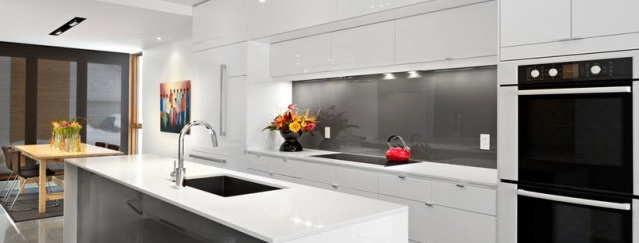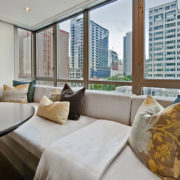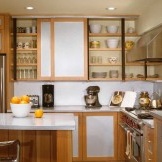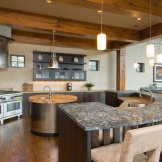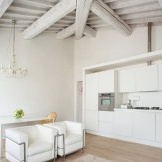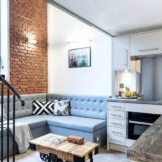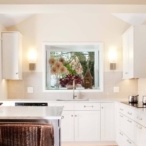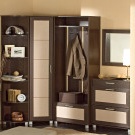Plexiglas apron
A kitchen apron is one of the most important details in the design of the kitchen, because the kitchen panel occupies a significant area and performs a protective and decorative function. For its manufacture, not so long ago, organic glass has been used since the material has excellent technical properties.
The main difference between plexiglass and silicate is that plexiglass cannot be broken even with a hammer. It can be damaged only by strong mechanical stress, and the glass does not crumble, but is cracked or crushed. When exposed to high temperatures, the material softens and is easy to stamp, while maintaining a clear outline of the relief of the stamp.
Advantages of Plexiglas Apron
- full color photo printing;
- the panel can be made of any shape;
- the material is stronger, lighter and cheaper than ordinary glass;
- plexiglass does not crack from severe temperature extremes;
- ease of installation;
- amenable to additional processing after installation (no need to plan holes in advance, etc.);
- maximum length without joints up to 4 m;
Consider examples of plexiglass-based kitchen aprons
Organic glass is presented in the form of a solid, durable glassy material with a high degree of transparency. Also, this material is called acrylate or acrylic, as it contains acrylic acids.
The manufacturing process of this material is not particularly difficult. Between two layers of glass, a liquid polymer substance with a hardener is poured. Then there is processing on special equipment. If necessary, it is painted in various shades, adding dyes, and zinc oxide is added to obtain a milky color. With the introduction of color additives, the image is not distorted.
Photo printing on plexiglass
The main advantages of plexiglass:
- can tolerate any mechanical processing, so it can be turned, drilled, cut, threaded;
- all initial characteristics and appearance during operation are preserved;
- when heated, this material can be bent to twist, thus giving the desired curvilinear shape;
- when burning harmful substances are not emitted, therefore it is referred to as environmentally friendly materials;
- possesses high dielectric properties.
Thanks to the use of modern production technologies and special additives, it is possible to obtain organic glass with specific properties, such as:
- heat resistance This glass is actively used in the manufacture of lighting devices;
- soundproofing. Used in the manufacture of window frames and interior doors;
- this glass has UV blocking radiation, which ensures the protection of exhibits in museums;
- heat reflection. Such organic glass is used for homes when a glass dome acts as a roof;
- plumbing properties. Glass with such properties is used for showers, a jacuzzi and interior items for a bathroom;
- when using anti-reflective and mirror glass, you can create a decorative interior decoration.
Plexiglass has a special role in applied art. Thanks to staining it in various colors, you can create deep overflow of shades and imitation of precious and semi-precious cameos, mother of pearl, crystal, which fascinate with its extraordinary beauty. Drawings are applied to glass in various ways using corrugation. It can be waves, drops, imitation under the skin or velveteen, so that the product becomes particularly decorative products. And if you use such glass as an internal illumination in the shower, then this will only enhance the effect.
Thanks to all the advantages presented, acrylic is successfully used in all areas of human activity. For example, it is used for the manufacture of parts for various devices, glazing of industrial and residential buildings, and is used as a structural material in the automotive industry, shipbuilding and commercial equipment. Plexiglas is also popular in the aviation industry, in ophthalmology - for the production of contact lenses and lenses.

